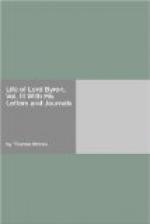“P.S. I hope
you sent back that poetical packet to the address
which I forwarded to
you on Sunday: if not, pray do; or I shall
have the author screaming
after his Epic.”
* * * * *
LETTER 179. TO MR. MURRAY.
“April 26. 1814.
“I have no guess at your author,—but it is a noble poem[27], and worth a thousand odes of anybody’s. I suppose I may keep this copy;—after reading it, I really regret having written my own. I say this very sincerely, albeit unused to think humbly of myself.
“I don’t like the additional stanzas at all, and they had better be left out. The fact is, I can’t do any thing I am asked to do, however gladly I would; and at the end of a week my interest in a composition goes off. This will account to you for my doing no better for your ‘Stamp Duty’ postscript.
“The S.R. is very civil—but what do they mean by Childe Harold resembling Marmion? and the next two, Giaour and Bride, not resembling Scott? I certainly never intended to copy him; but, if there be any copyism, it must be in the two poems, where the same versification is adopted. However, they exempt The Corsair from all resemblance to any thing, though I rather wonder at his escape.
“If ever I did any thing original, it was in Childe Harold, which I prefer to the other things always, after the first week. Yesterday I re-read English Bards;—bating the malice, it is the best.
“Ever,” &c.
[Footnote 27: A Poem by Mr. Stratford Canning, full of spirit and power, entitled “Buonaparte.” In a subsequent note to Mr. Murray, Lord Byron says,—“I do not think less highly of ‘Buonaparte’ for knowing the author. I was aware that he was a man of talent, but did not suspect him of possessing all the family talents in such perfection.”]
* * * * *
A resolution was, about this time, adopted by him, which, however strange and precipitate it appeared, a knowledge of the previous state of his mind may enable us to account for satisfactorily. He had now, for two years, been drawing upon the admiration of the public with a rapidity and success which seemed to defy exhaustion,—having crowded, indeed, into that brief interval the materials of a long life of fame. But admiration is a sort of impost from which most minds are but too willing to relieve themselves. The eye grows weary of looking up to the same object of wonder, and begins to exchange, at last, the delight of observing its elevation for the less generous pleasure of watching and speculating on its fall. The reputation of Lord Byron had already begun to experience some of these consequences of its own prolonged and constantly renewed splendour. Even among that host of admirers who would have been the last to find fault, there were some not unwilling to repose from praise; while they, who had been from the first reluctant eulogists, took advantage of these apparent symptoms of satiety to indulge in blame.[28]




